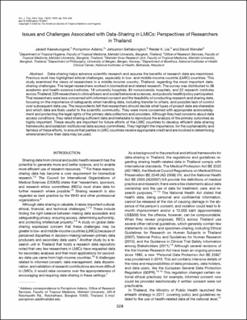| dc.contributor.author | Kaewkungwal, Jaranit | |
| dc.contributor.author | Adams, Pornpimon | |
| dc.contributor.author | Sattabongkot, Jetsumon | |
| dc.contributor.author | Lie, Reidar K | |
| dc.contributor.author | Wendler, David | |
| dc.date.accessioned | 2021-05-20T12:19:44Z | |
| dc.date.available | 2021-05-20T12:19:44Z | |
| dc.date.created | 2020-08-23T12:35:32Z | |
| dc.date.issued | 2020 | |
| dc.Published | American Journal of Tropical Medicine and Hygiene. 2020, 103 (1), 528-536. | |
| dc.identifier.issn | 0002-9637 | |
| dc.identifier.uri | https://hdl.handle.net/11250/2755889 | |
| dc.description.abstract | Data-sharing helps advance scientific research and assures the benefits of research data are maximized. Previous work has highlighted ethical challenges, especially in low- and middle-income countrie (LMIC) countries. This study examined the views of researchers in a middle-income country, Thailand, regarding the most important data-sharing challenges. The target researchers worked in biomedical and related research. The survey was distributed to 38 academic and health-science institutes, 18 university hospitals, 84 nonuniversity hospitals, and 22 research institutes across Thailand; 229 researchers in clinical/basic and social/behavioral sciences, and pubxxlic health/policy participated. Thai researchers were less concerned with informed consent and the feasibility of conducting research and sharing data, focusing on the importance of safeguards when handling data, including transfer to others, and possible lack of control over subsequent data use. The respondents felt that researchers should decide what types of project data are shareable and which data are likely useful to the scientific community. They were more concerned with appropriate acknowledgment and protecting the legal rights of the primary data collectors and providers. Although they had concerns about data access conditions, they rated sharing sufficient data and metadata to reproduce the analysis of the primary outcomes as highly important. These results are important for future efforts of the LMIC countries to develop efficient data-sharing frameworks and establish institutional data access committees. They highlight the importance, for the sustainability and fairness of these efforts, to ensure that parties in LMIC countries receive appropriate credit and are involved in determining where/when/how their data may be used. | en_US |
| dc.language.iso | eng | en_US |
| dc.publisher | The American Society of Tropical Medicine and Hygiene | en_US |
| dc.rights | Navngivelse 4.0 Internasjonal | * |
| dc.rights.uri | http://creativecommons.org/licenses/by/4.0/deed.no | * |
| dc.title | Issues and challenges associated with data-sharing in LMICs: perspectives of researchers in Thailand | en_US |
| dc.type | Journal article | en_US |
| dc.type | Peer reviewed | en_US |
| dc.description.version | publishedVersion | en_US |
| dc.rights.holder | Copyright 2020 The American Society of Tropical Medicine and Hygiene | en_US |
| cristin.ispublished | true | |
| cristin.fulltext | original | |
| cristin.qualitycode | 1 | |
| dc.identifier.doi | 10.4269/ajtmh.19-0651 | |
| dc.identifier.cristin | 1824635 | |
| dc.source.journal | American Journal of Tropical Medicine and Hygiene | en_US |
| dc.source.40 | 103 | |
| dc.source.14 | 1 | |
| dc.source.pagenumber | 528-536 | en_US |
| dc.identifier.citation | American Journal of Tropical Medicine and Hygiene. 2020, 103(1), 528–536 | en_US |
| dc.source.volume | 103 | en_US |
| dc.source.issue | 1 | en_US |

